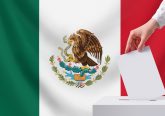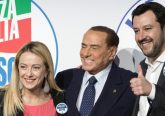George Weah’s recent election as President of Liberia is not only noteworthy for being the first peaceful transition of power in the country since 1944. His victory is also “a lesson in how sports fame can help propel figures with humble beginnings to positions of great importance.” Weah is not the only former striker who has transitioned from scoring goals to winning votes. While there is no shortage of lists of former players-turned-politicians, a closer look at three of the game’s most popular players reveals how they have leveraged their fame, wealth and appeal to mount successful populist campaigns.
George Weah: President of Liberia
Playing for Paris St Germain, AC Milan, Chelsea and Manchester City, George Weah is the first and only African footballer to have won FIFA’s world player of the year and Ballon D’Or award. He entered politics after his retirement from football in 2002, unsuccessfully running for President in 2005 and 2011, and has been a Senator since 2014. Weah won the first round of the Liberian Presidential election in October 2017 with 38.4% of the vote. In the run-off election, Weah secured 61,5% of the vote, becoming the new President of Liberia.
His campaign has not been without controversy. His running mate was Jewel Taylor, ex-wife of the jailed former-President Charles Taylor. Opponents have pointed to his lack of experience in government and slim legislative record. For supporters, however, “King George” represents a change from a stale, technocratic government to someone who “cares for the youths and common people.”
Many believe that Weah would fight for the poor because he understands their plight and problems. As one voter remarks: “Some of the struggle that I have passed through — George Weah has passed through that struggle.” Indeed, Weah’s rags-to-riches story has been an inspiration to many supporters. Hailing from one of Monrovia’s shanty towns, his “soccer talent took him from a slum surrounded by swamps in Liberia to superstardom.”
Romario: Senator in Brazil
Romario, part of the Seleção squad victorious at the 1994 World Cup, has been a Brazilian Senator for Rio de Janeiro since 2014. Considered one of Brazil’s all-time greats on the pitch, Romario was “a rebel rarely out of trouble.” His hard-partying and late-night escapades were constantly in the headlines until he retired from professional football in 2009. During his illustrious career as striker, Romario scored 55 goals in 70 appearances for the Brazilian national team. Named FIFA Player of the Year in 1994, Romario is one of only a handful of players recorded to have scored, although controversially, 1000 goals during their career.
As politician, Romario served as a Federal Legislator for Rio de Janeiro from 2011 before being comfortably elected Senator in 2014, winning 63.4% of the vote for the Rio de Janeiro seat. Commenting on his victory, he wrote: “This electoral scenario proves that the population is tired to vote for those born with a silver spoon, they rather want to see their mirror image in Congress. Today, making history, an ex-favelado became Senator.”
Romario has been characterized as “dogged populist politician.” While he has focused on topics close to his heart, such as disability rights, motivated by the lack of representation for those like his daughter who have Downs Syndrome, he has also long been a fierce critic of corruption, especially in connection to the 2014 World Cup held in Brazil.
Cuauhtemoc Blanco: Mayor in Mexico
Cuauhtemoc Blanco, “one of the greatest Mexican soccer players of all time,” has been the mayor of Cuernavaca, a colonial city of 350 000 inhabitants in the state of Morelos, since 2015. Despite representing the relative obscure Social Democrat Party and announcing his sudden foray into politics whilst still playing football, Blanco handily won the election.
The striker has been a “fiery fan favourite,” famous for his craftiness and cunning in front of the goal. His signature move—the Cuauhteminha, which sees him hold a ball between his feet, and then jump in between two defenders —became world famous. Off the pitch, Blanco made headlines for his hot temper, and, “for hitting the nightclubs with as much gusto as he does the soccer ball.”
Blanco’s short stint in office has been no less controversial. He had to withstand allegations of being involved in murder and associated with drug cartels. He survived an impeachment attempt in 2016, has already broken with his former political allies and repeatedly clashed with the Governor of Morelos. Nonetheless, he has announced his intentions to run for Governor himself in 2018, vowing to go after corrupt politicians.
Blanco is an outspoken populist outsider par excellence. “Cuauh” has railed against “legislators that sell themselves for a few cents” and has vowed: “I won’t steal a pinche peso.” Indeed, part of his appeal is not only his bluntness, but also the promise that he would not steal public money, because he is already a millionaire. Despite this fact, he has been portrayed as “man of the people” with constant emphasis on his humble origins. “Cuauh” stresses how different he is from other politicians: “I am just like one of you, you’re going to see me on the streets, not like those other politicians that stay home and hide and remain unreachable.”
Conclusion
George Weah, Romario and Cuauhtemoc Blanco have secured electoral victories by leveraging their name recognition and the remaining support from their playing days. Their rags-to-riches stories give them credibility in connecting with impoverished voters and in claiming to not need to steal any public money because they are already wealthy. In society’s rife with discontent about corruption and general disenchantment with politics, the simple populism of these three former goal scorers has struck a chord. Their promise, and appeal, is concisely summed up by “Cuauh”: “I am not a politician. I am not going to steal from you. I come from below like you.” This, it turns out, may just be enough for former world-class strikers to win over voters.






